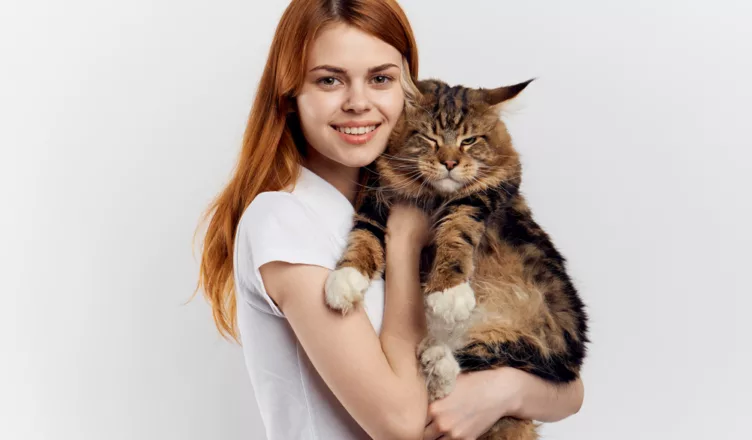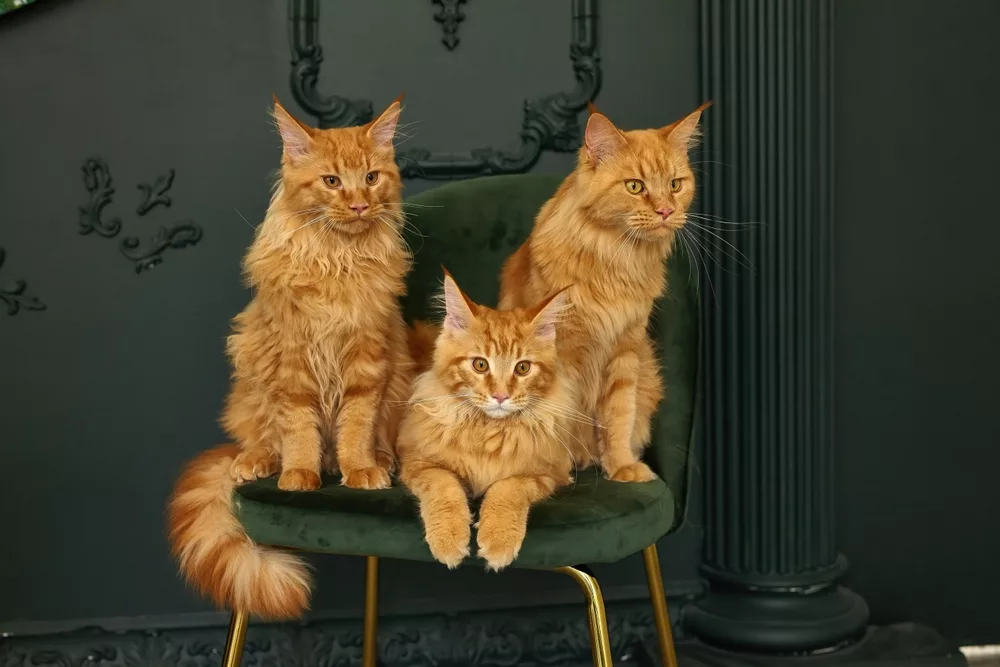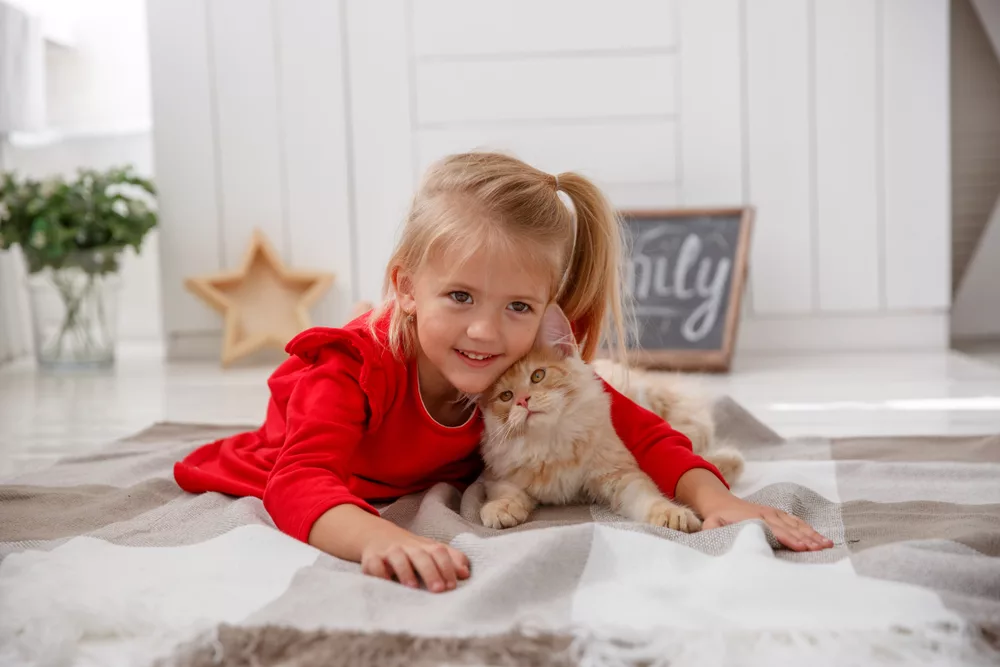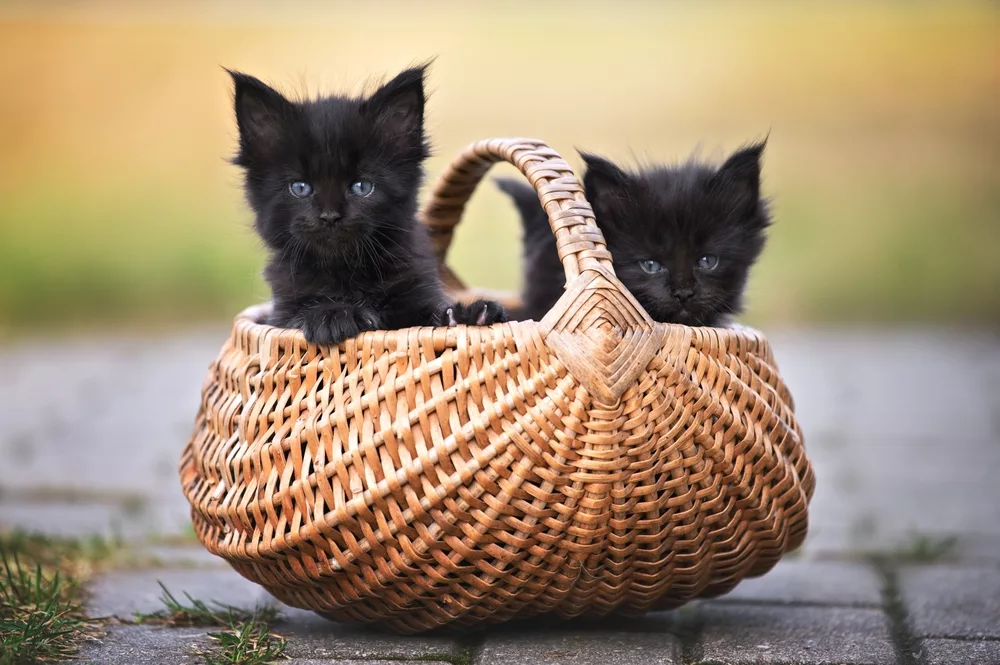Maine Coon cats are known for their majestic size, gentle personalities, and unique appearance. Integrating Maine Coon kittens into a family environment with an existing Maine Coon can be challenging but rewarding. I titled this article, Maine Coon Cats, Kittens and the Rest of the Family because it’s a story for anyone thinking of introducing a new kitten into a family environment where there is already a Maine Coon in residence.
This article shares the journey of how King Henry, an older Maine Coon, coped with a new silver-blotched tabby kitten, The Jester, joining the household.
The Maine Coon Universe
Maine Coons are often compared to the wild Serval cat due to their size and tufted ears. However, Maine Coon is the largest domesticated cat breed with a gentle temperament, unlike the wild and elusive Serval.
Several organizations, such as The International Cat Association (TICA), Fédération Internationale Féline (FIFe), and Cat Fanciers’ Association (CFA), are dedicated to promoting the welfare, responsible breeding, and recognition of Maine Coon breed in cat shows.
When considering adding the gigantic feline to your family, remember Maine Coon size and price range. The Maine Coon price can vary, counting on aspects such as pedigree, coat color, and breeder reputation.
Welcoming a Maine Coon into Your Family
Whether you choose to adopt a Maine Coon kitten or an adult cat, the first week in the life of your new family member will be filled with excitement and adjustments. If you’re opting for Maine Coon adoption. In that case, many Maine Coons require loving homes, so explore options from Maine Coon rescue or shelter organizations.
If you are in search of Maine Coon kittens for sale from Maine Coon breeders, do thorough research to find a reputable Maine Coon cattery. Reputable breeders will prioritize their cats’ health, Maine Coon temperament, and well-being and provide ongoing support and guidance.
Life With a Maine Coon Cat
Like their possible ancestor, the Norwegian forest cat, Maine Coons are big cats, obligate carnivores, and excellent companions. Living with a Maine Coon is an entertaining adventure, as they are known for their gentle and sociable nature.
These cats often form strong bonds with their families and are great with children and other pets. However, they’ll show some obvious resistance because it’ll take some time for them to accept the changes.
Introducing Maine Coon to Your Existing Pets
When bringing a Maine Coon into a home with existing pets, it’s essential to provide a gradual introduction to ensure a harmonious relationship. Allow your Maine Coon and other pets to get used to each other’s scents and sounds before allowing them to interact.
Supervise initial meetings and provide positive reinforcement for good behavior. Before the arrival of The Jester, King Henry sensed something was happening, becoming territorial and sensitive. He started pulling his fur out, developing a raw skin patch on his neck.
To address the issue, King Henry was treated with a cream from the vet to heal his sores. To help with his emotional stress, Feliway, a pheromone-based product, was used.
Upon introducing The Jester to King Henry, the intensity of hostility from the older cat was surprising. It took 15 days for King Henry to accept the new arrival, with the cats kept separate for most of this time.
The cats were allowed to spend time in each other’s environments to become familiar with one another’s scents. Later, they were allowed to interact briefly, with King Henry hissing, spitting, and swiping at The Jester and any human nearby.
Establishing Harmony Between Cats
Initially, there was hesitancy to become attached to the new kitten in case King Henry did not accept him. And it was unsettling for everyone. I thought we’d made a big mistake. The possibility of returning The Jester to the breeder was considered.
The breeder had already kindly agreed to take Jester back if need be. As a last try, we decided to try using ‘Feliway’ again – a liquid plugged into the wall to release pheromones.
If you’re not familiar with it comes in a spray bottle and as a plug-in like an air freshener. When Feliway was placed near King Henry’s tree, it significantly improved his behavior and acceptance of The Jester.
King Henry received gentle encouragement and affection, helping him to settle down and accept the new kitten. By gradually increasing King Henry’s time with The Jester, the cats began to bond and form friendships.
King Henry eventually enjoyed the company of his new playmate, becoming less demanding of human attention and engaging in playful moments with The Jester. The furry boys are now the best of friends. Henry is much less demanding of human attention and enjoys his rough-and-tumble moments with his new playmate.
Concerns for Family Safety, Especially Younger Children
Maine Coons are also called dogs of the cat world because they are very loyal in nature and patient with children. Teach your children how to interact respectfully with your Maine Coon to ensure a strong bond between them. Encourage soft play and provide supervision to prevent accidents or misunderstandings.
With an unsteady 12-month-old baby in the household, there were concerns about the baby getting hurt due to King Henry’s aggression. Precautions were taken to ensure the baby’s safety during the integration process.
Benefits of Adopting Sibling for Resident Maine Coon Cat
Adding an adopted sibling to your family can benefit your resident Maine Coon, enhancing their well-being and overall quality of life.
Companionship
Maine Coons are very social that thrive on interaction and companionship. Having an adopted sibling provides your resident Maine Coon with a constant playmate, which can alleviate feelings of loneliness or boredom when you’re not home to provide attention.
Encouraging Play and Exercise
An adopted sibling can encourage your resident Maine Coon to engage in more play and exercise. Playful interactions between the two cats can help them physically fit, maintain a healthy weight, and improve overall muscle tone.
Reducing Stress and Anxiety
Introducing an adopted sibling can help reduce stress and anxiety in your resident Maine Coon by providing a comforting presence and companionship. The interaction between the two cats can help build a sense of security and support in their shared environment.
Socialization and Learning
An adopted sibling can help improve the social skills of your resident Maine Coon, mainly if they have been an only cat for an extended period. The new cat’s presence can allow your resident cat to learn new behaviors and improve communication skills with other animals.
Sharing Responsibility
Introducing an adopted sibling can help distribute some of the attention demands your resident Maine Coon may place on you. The two cats can entertain each other, giving you more time to focus on other tasks without feeling guilty about leaving your cat alone.
Creating a Balanced Household
An adopted sibling can help create a balanced household dynamic by providing a playmate for your resident Maine Coon. This can result in a more harmonious environment, with each cat having a companion to share experiences and bond with.
Caring for Your Maine Coon Family
Once you have a Maine Coon friend in your home, it is essential to follow the following guidelines for keeping your feline friend and yourself happy and hassle-free.
Diet for Maine Coon Cats, Kittens
Feeding your Maine Coon a high-quality diet is essential for maintaining their health. Choose a Maine Coon food specifically formulated for the breed. Consider incorporating wet food and supplements to support their unique nutritional needs.
Exercise and Play
Most Maine Coons love to play games. Provide your cat with various Maine Coon toys and activities to keep them entertained, such as interactive puzzles, catnip toys, and feather teasers. Engaging in regular playtime and exercise helps to keep your Maine Coon physically fit and mentally stimulated. Providing climbing shelves or cat trees can encourage exercise and exploration.
Training and Socialization
Maine Coons are intelligent cats and can be trained to do tricks, walk on a leash, and even play fetch. Consistent, positive reinforcement is key for Maine Coon training. Socialization from a young age helps your Maine Coon become a well-adjusted and confident adult cat.
Grooming and Hygiene of Maine Coons
Grooming and hygiene play a crucial role in maintaining the overall health and well-being of your Maine Coon cat.
|
Aspect |
Description |
| Coat Care |
Regular brushing and combing to prevent matting, remove loose hair, and keep the coat healthy and shiny. |
| Dental Health |
Regular teeth brushing with to prevent tartar buildup and gingivitis. |
| Ear Cleaning | Inspecting and cleaning ears as needed to remove dirt, debris, and prevent infections. |
|
Nail Trimming |
Regular nail trimming to prevent overgrowth, discomfort, and potential injuries to the cat and household items. |
| Eye Care |
Monitoring eye health and gently wiping away any eye discharge with a damp cloth to maintain cleanliness. |
| Bathing |
Occasional bathing to keep your Maine Coon’s coat clean, especially if they have gotten into something dirty. |
Maine Coon Coat Care
Regular Maine Coon grooming is a vital element of proper Maine Coon care, as their luxurious coats require brushing at least twice a week to prevent matting and tangles. Gently groom your Maine Coon with a wide-toothed comb or slicker brush, particularly areas prone to matting, such as behind the ears and under the legs.
Maine Coon Dental Health
Maintaining your Maine Coon cat’s dental health is essential to their overall well-being. Brush their teeth regularly using a cat-specific toothbrush and toothpaste to prevent dental issues such as tartar buildup and gingivitis.
Allergy Considerations
Some people may be allergic to Maine Coons, which produce allergens like any other cat breed. However, no cat breed is truly hypoallergenic. Spend time around Maine Coons before committing to adoption or purchase to gauge their reaction in case you or someone in your family has allergies. Also, consider Maine Coon allergies that hurt the feline friend.
Sleeping Areas
Provide your Maine Coon with a comfortable and cozy sleeping area, such as a cat bed or a blanket, in a quiet corner of your home. Maine Coons enjoy having their own space where they can retreat and rest.
Litter Box Maintenance
Maine Coons, like all cats, require a clean and well-maintained litter box. Choose a large, high-sided litter box to accommodate their size, and clean it daily to ensure a hygienic environment.
The Joy of Maine Coon Companionship
Maine Coon cat breed has dog-like traits and is good with kids, dogs, and other cats. Introducing a new Maine Coon kitten or cat to your family, especially when you already have a resident Maine Coon, can be a rewarding and fulfilling experience for you and your feline companions.
By being patient, providing gradual integration, and ensuring proper care, you can create a loving and harmonious environment for your Maine Coon family.
The benefits of adopting a new furry sibling for your resident Maine Coon include companionship, increased play, and exercise, reduced stress and anxiety, improved socialization, shared responsibility, and a more balanced household dynamic. You can foster a successful and happy integration by carefully considering your cats’ personalities and monitoring their interactions.
Remember to prioritize your Maine Coon cat’s life, health, and well-being, provide mental and physical stimulation, and offer affection and support to strengthen the bonds within your furry family. With love, patience, and care, your Maine Coon family will flourish, bringing joy and happiness to your home for years.
FAQs
Are Maine Coon kittens good with kids?
Maine Coon kittens are generally good with children. They are known for their friendly, gentle, and affectionate nature, making them suitable companions for children. They are known as gentle giants. However, it is essential to teach children how to interact appropriately with kittens and supervise their interactions.
How many kittens do Maine Coon cats have in a litter?
Maine Coon cats typically have litters of 3 to 5 kittens, which can vary depending on the individual cat. Some litters may have as few as 1 or 2 kittens, while others may have up to 7 or 8 kittens.
Do Maine Coon kittens get along with other cats?
Maine Coon cats, kittens generally get along well with other cats and pets, who are sociable and enjoy companionship. However, the success of their integration with them will depend on the personalities of the kitten and the resident cat(s) and the introduction process.
What is the difference between a Maine Coon kitten and a normal kitten?
The primary difference between a Maine Coon cat and a normal cat is that Maine Coon kittens are a specific cat breed known for their large size, tufted ears, and long, luxurious fur. They are generally more social, friendly, family pet, and laid-back than other cat breeds. A “normal” kitten refers to any non-pedigree or mixed breed kitten without specific characteristics.



